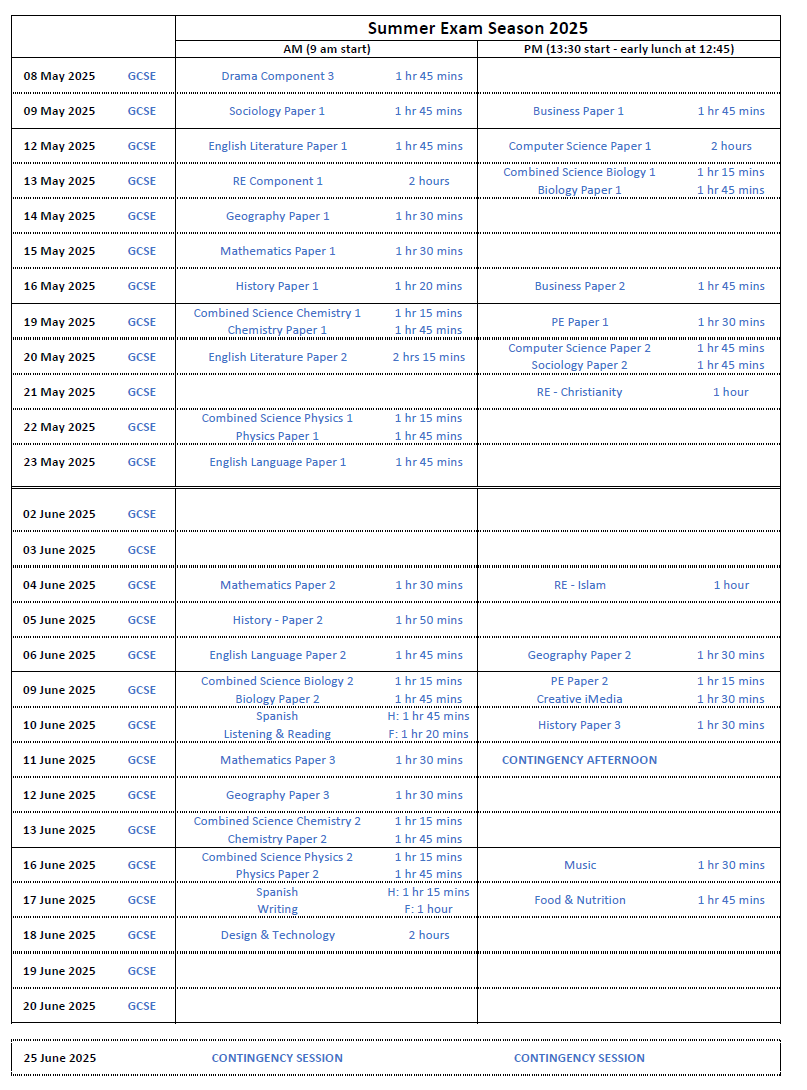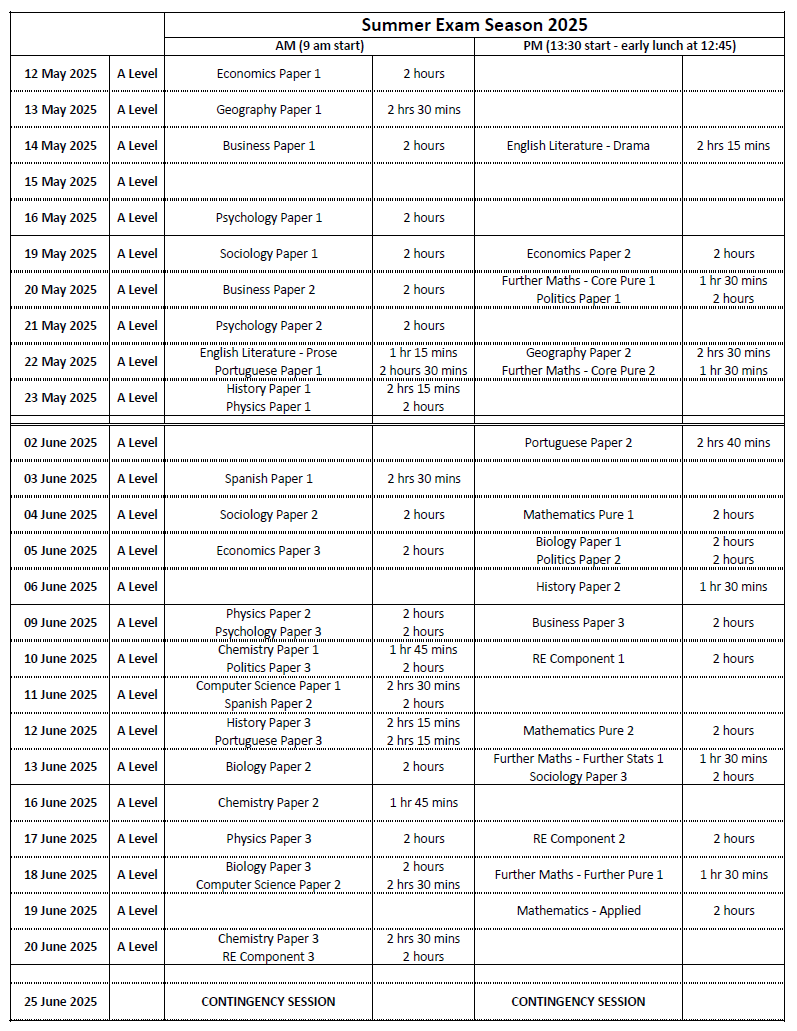- Home
- Sixth Form
- Examination
Examination
Sitting examinations, believe it or not, should be an enjoyable experience with students having the opportunity to demonstrate their knowledge and skills.
We recognise that in an ideal world, most young people would not want to go through the ordeal of examinations but that is the system we have – and that is the system that Loxford School Trust has been very successful at supporting students through for many years.
Please visit this page regularly for important Cecil Jones Academy examination updates.
Should you have any queries please ask to see the Exams Officer or your ATL.
Summer Exam Season 2025
GCSE Exam Timetable
preparing young people for exam results day

Revising
There is no one way to revise as every pupil has their own learning style, however the following tips may help:
- Ensure you fully understand what to revise. What topics do you need to understand? What does the exam specification say?
- Manage your time. Planning to spend 4-5 hours on one topic is unrealistic. Create a suitable timetable which makes time for rest and other activities.
- Check your understanding by practising exam style questions. Feedback from teachers is vital at this point, to see if you are on the right track.
- Start revision early. Trying to cram a 2-year course into 6 weeks has never worked!
- Find an appropriate environment. Some people work better alone and some work better in a group. Some people work better with music and other don’t. Find what’s best for you!
- Set yourself revision goals. Aim to complete certain tasks every time you revise that way you will be able to monitor and track how much you have done/need to do.
| The 9 BEST Scientific Study Tips | How to revise for exams effectively |
| https://www.youtube.com/watch?v=p60rN9JEapg | https://www.youtube.com/watch?v=JrXMrH7E4Jw |
| How to study effectively with flashcards | Revision techniques - the good, the OK and the useless |
| https://www.youtube.com/watch?v=mzCEJVtED0U | https://www.bbc.co.uk/news/health-22565912 |
| Alternative ways to revise | Cornell note taking |
| https://www.whatuni.com/advice/sixth-form-life/21-alternative-ways-to-revise/72112/ | https://www.youtube.com/watch?v=ErSjc1PEGKE |
| BBC Bitesize | Get Revising |
| https://www.bbc.co.uk/bitesize | http://getrevising.co.uk |
| Revision World | |
| https://revisionworld.com/ |
Useful revision links
Past Papers for Revision
Revise and prepare for your exams by practicing past exam papers. Past papers are a handy way for you to check the level of questions you will need to answer in an exam and hence this makes them a great revision tool.
Past papers will not help you predict the questions or topics that are likely to come up in exams but you can use them to:
- Assess whether you have learnt the material;
- Identify gaps in your knowledge.
To access past papers to help with your revision, please click on the exam board links below:
- AQA Exam Board Past Papers;
[https://www.aqa.org.uk/find-past-papers-and-mark-schemes]
- Edexcel Exam Board Past Papers;
[https://qualifications.pearson.com/en/support/support-topics/exams/past-papers.html]
- OCR Exam Board Past Papers;
[https://www.ocr.org.uk/qualifications/past-paper-finder/]
- EDUQAS Exam Board Past Papers.
Subject Exam Boards - GCSE
Subject Exam Boards - A Level
During the Examination Season
Before the Examination
Again, everyone has their own personal routines, but these tips could make the difference:
- Ensure you know the correct time, date and venue of the exam
- Prepare resources the night before (i.e. calculator, pen, pencil etc.)
- Get a good night’s sleep.
- Have a good breakfast and stay hydrated
- Don’t be put off by what others say.
- Think positively; don’t underestimate yourself.
- Visualise your revision material and remain calm.
During the Examination
It’s important to remain focused during an examination. If you have put in the hours preparing, then the exam is just a chance for you to showcase your talent!
- Read the question carefully. Read it more than once and take time to think about your answer
- Save time by not repeating the question.
- Use the amount of marks to gauge how many points to make.
- Understand the command words (describe, list, evaluate, explain etc.)
- Re-read your answers and double check you have included everything.
After the examination:
Time to reflect on the exam and ask yourself the following questions:
- What did you do well?
- What have you learnt for the next examination?
- What do you need to improve next time?
Coping with GCSEs and A Levels
- The work you do now is extremely important.
- Work hard now and you will be better prepared. Never settle for a first draft of work. You can always improve.
- Complete all classwork and homework! Missing work could potentially cost you marks and that grade you want to achieve.
- At the end of the day you study for yourself and your bright and wonderful future!
Planning a Successful Journey through Exams
- Become familiar with the way that each exam course is taught.
- Be clear about what is being examined and how.
- Know when examinations are due to take place.
- Look ahead and see how the programme being studied has been prepared.
- Look ahead and anticipate times when work has to be complete and passed on for assessment.
When students receive a full examination timetable check the dates and add them to calendars and planners.




